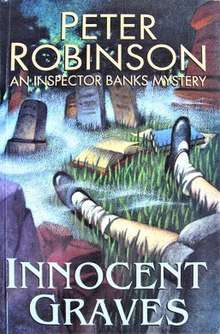Innocent Graves
Innocent Graves is the eighth novel by Canadian detective fiction writer Peter Robinson in the Inspector Banks series of novels. The novel was first printed in 1996, but has been reprinted a number of times since. The novel was selected by Publishers Weekly as one of the best mysteries of the year, nominated for the 1996 Hammett Prize,[1] and won the 1997 Arthur Ellis Award for 'Best Novel'.[2]
 | |
| Author | Peter Robinson |
|---|---|
| Country | Canada |
| Language | English |
| Series | Inspector Alan Banks, #8 |
| Genre | Crime novel |
| Publisher | Macmillan |
Publication date | 1996 |
| Media type | Print (Hardback), (Paperback) |
| ISBN | 0-330-48218-1 |
| OCLC | 47037141 |
| Preceded by | Dry Bones That Dream |
| Followed by | Dead Right |
Plot
When last seen alive, sixteen-year-old Deborah Harrison was on her way home from school. Her friend Megan thinks she saw the shadowy figure of a man behind Deborah as they waved goodbye on the bridge, but the fog was so thick that evening she can’t be sure. Not long after, Deborah’s body is found in the local cemetery. The murder terrorises the wealthy enclave of St Mary’s, Eastvale, and because Deborah was the daughter of a prominent industrialist, high-flying new Chief Constable Jeremiah "Jimmy" Riddle puts pressure on Detective Chief Inspector Alan Banks and his team to catch the killer without delay. And soon, partly thanks to the work of new boy Detective Inspector Barry Stott, it looks as if they have done. But Banks is not convinced. While the community breathes a collective sigh of relief and turns into a lynch-mob, Banks examines the loose ends: a vicar, accused of sexually harassing a refugee worker, who lies about his whereabouts at the time of the murder; his straying wife; a schoolteacher with a dark secret; the accused’s vindictive ex-girlfriend; a teenage thug who has threatened Deborah and her family with violence. And then there are Deborah’s own family secrets. With each new piece of information, a different pattern is formed, until Banks is forced to incur the wrath of Jimmy Riddle if he hopes to solve the case.
Original story
Robinson wrote a short story Innocence in 1990, about Terry Reed who was accused then cleared of the murder of a schoolgirl. Robinson next wrote an entire novel from Reed’s point of view, which was turned down by his publisher. He then thought it might work better with DI Banks, and rewrote the novel as Innocent Graves with DI Banks and Reed as Owen. The short story Innocence was published in Not Safe After Dark (1998); see Introduction to the collection.
Adaptation
When the story was adapted for television, it was heavily edited and was noted for not bearing much resemblance to the original book. For example, the murder victim was now known as Ellie Clayton; Ellie was last seen leaving her local theatre group, rather than her school; her body was found a popular beauty spot at Valley's Edge, rather that in the local cemetery; Ellie's father is an internet entrepreneur, rather than an industrialist; and the suspects are her father's business partner, her father, her on-off one-man crime spree boyfriend; and her theatre tutor; rather than a vicar, his wife, or an ex-girlfriend of the accused. The episode was also heavily reminiscent of DC Ken Blackstone's actions, rather than Jimmy Riddle.
References
- "The Hammett Prize: Past Winners, Nominees, and Judges". www.crimewritersna.org. International Association of Crime Writers, North American Branch. Retrieved 17 February 2017.
- "Arthur Ellis Award Winners 1984-2005". Crime Writers of Canada. Retrieved 17 February 2017.